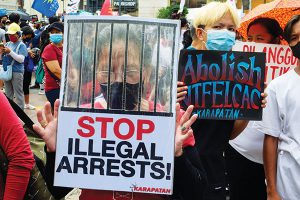Bloomberg
Ferdinand Marcos Jr., the late Philippine dictator’s son and namesake, was to be officially sworn in as president on Thursday, completing his family’s political revival nearly four decades after his father’s ouster.
Marcos met with President Rodrigo Duterte at the presidential palace, where the outgoing leader was also given departure honors. The incoming president will take the oath of office at the Old Legislative Building in Manila, where his father worked as a lawmaker and which now houses the National Museum. The incoming leader said in a video blog over the weekend that he wanted a solemn inauguration that sticks with tradition.
The former senator returns to the presidential palace where he spent his youth before his family fled in 1986 due to a popular mass uprising. He won the presidency by a landslide with a campaign that promised unity and measures to spur the economy after the pandemic, even as opponents accused him of misportraying the dictatorship as a golden era for the Philippines.
“The Marcos name has essentially been rehabilitated,†said Ronald Holmes, a political science professor at De La Salle University in Manila. “However, his performance will still determine if his family’s name will be acknowledged. If he misperforms, then it will be the opposite.â€
President Duterte’s daughter, Sara Duterte, will assume the vice presidency after teaming up with Marcos for the elections and bringing together two powerful political clans. The incoming officials face a raft of economic challenges, including surging inflation and government debt that ballooned due to the pandemic.
The elder Duterte’s six years in power were marked by a war on drugs, which has killed more than 6,000 according to government data. Human rights groups however estimate the death toll is much higher, mostly poor Filipinos in urban areas.
Even so, President Duterte enjoyed high popularity ratings that allowed him to keep majority support in Congress and pursue key reforms including an overhaul of the country’s tax system. The outgoing administration’s pivot to China and away from the US began soon after the fiery populist took office in 2016. Near the end of his term, Duterte ended talks with China on oil exploration in the disputed South China Sea.
 The Gulf Time Newspaper One of the finest business newspapers in the UAE brought to you by our professional writers and editors.
The Gulf Time Newspaper One of the finest business newspapers in the UAE brought to you by our professional writers and editors.
